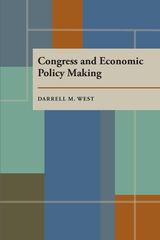
Economic policymaking has perpetually been one of the central dilemmas facing Congress, leading to huge budget deficits and disagreements among legislators about spending priorities and tax policies.
This book examines congressional decision making on economic policy during the Reagan administration. It looks at legislative actions on Reaganomics, tax reform, and the politics of deficit reduction, and shows the importance of looking not just at the consequences of these decisions but also at the legislative processes that led to them.
Using an “activist-based” approach and previously unexamined data, Darrell West shows that district activists, often more conservative than the public at large, exerted a disproportionate and misleading effect on congressional voting. When this support eventually proved unstable, a more skeptical Congress began to eventually back away from the president's policies. This move had serious consequences for deficit reduction and policy initiation, and also influenced the final shape of the tax reform package adopted in 1986.
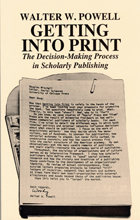
Throughout, the sociology of organizations and of culture serves as Powell's interpretive framework. Powell shows how scholarly publishers help define what is "good" social science research and how the history and tradition of a publishing house contribute to the development of an organizational identity. Powell's review of actual correspondence, from outside letters proposing projects to internal "kill" letters of rejection, suggests that editors and authors at times form their own quasi-organization with external allegiances and bonds beyond those of the publishing house.
"This is a welcome addition to the literature on the life of the organizations that produce our science and our culture. Powell's intimate look at two scholarly publishing companies has an insider's appreciation of the book business and an outsider's eye for questions the editors are not asking themselves."—Michael Schudson, University of California at San Diego
"Getting Into Print will long be the book about how academic editors choose the titles they sponsor. Even experienced editors and authors will find new insights here and revealing comparisons with decision-making in other kinds of organizations."—Edward Tenner, Los Angeles Times Book Review
"Getting Into Print is an unusually outstanding ethnographic study in that it reflects the evocative richness of detail associated with the ethnographic approach while simultaneously maintaining a clear-headed, analytical distance from the subject that allows for a meaningful theoretical contribution. Powell is an astute ethnographer who presents a vital and compelling 'insider's view' of the decision-making process in scholarly publishing, making this book fascinating reading for all those involved in the 'publish-or-perish' syndrome."—Barbara Levitt, American Journal of Sociology

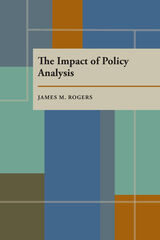
Government agencies spend billions of dollars each year for policy analysis with the expectation that improved policy will follow. Although civil servants conduct some analysis themselves, more frequently they contract with research organizations to assess the probable consequences of new social policies and to answer other policy questions.
Jams M. Rogers develops a theory that explains and predicts the impact of policy analysis. He illustrates his theory through welfare reform, where policy analysis is caught in political warfare and has little chance to improve actual policy.
During the 1960s and 1970s over $108 million was spent on four unprecedented social scientific experiments to test the effectiveness of a major proposal to reform the welfare system. Now out of favor, the negative income tax was thn considered to be an appealing alternative to welfare. Starting in New Jersey and Pennsylvania during the Johnson administration, the experimental research continued through Carter's term and helped to keep reform proposal and research organizations alive. This book examines the results of these experiments and their effect on Carter's reform attempt—the Program for Better Jobs and Income.
One of the author's main conclusions concerns the role of value conflict. If there is strong disagreement within society over the goals of policy, analysis will seldom change the minds of decision makers or influence policy. Policy analysis is more likely to influence thinking and policy if the issue involves low conflict.

Contributors: Barry Boyer; Colin S. Diver; Daniel J. Gifford; Keith Hawkins; Peter K. Manning; Errol Meidinger; Robert L. Rabin; Paul Rock; and John M. Thomas.
Few scholars have applied modern behavioral and organization theory to study U.S. regulatory agencies, and fewer still have integrated this approach with frameworks drawn from administrative law and analysis. This multidisciplinary collection combines detailed case studies with theoretical discussions drawing upon legal concepts, organizational analysis, and behavioral theory.
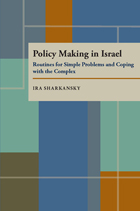
All governments face problems and are judged by their ability to solve them and the policies they develop in doing so. Compared with other Western democracies, Israel has faced a devastating number of problems of unusual severity in a relatively short time: war, terrorism, heavy immigration, unsettled boundaries, economic stresses, internal disputes about ethnicity and religion, and the lingering scars of the Holocaust and other persecutions. Sharkansky’s analysis of the Israeli government’s routines and methods for coping with such an array of difficulties, from simple to complex to intractable, offers general insights into how governments make policy in a democracy.
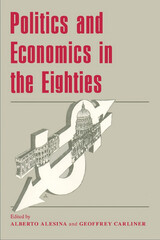
Certain to provoke controversy, this interdisciplinary volume brings together policy experts to provide a coherent analysis of the most important economic policy changes of the 1980s. Through a detailed examination of voting patterns, monetary and fiscal policies, welfare spending, tax reform, minimum wage legislation, the savings and loan collapse, and international trade policy, the authors explore how politics can influence the direction of economic policymaking.

This book explores how policy ideas are spread—or diffused—in an age in which policymaking has become increasingly complex and specialized. Using the concept of enterprise zones as a case study in policy diffusion, Karen Mossberger compares the process of their adoption in Virginia, Indiana, Michigan, New York, and Massachusetts over a twelve-year period.
Enterprise zones were first proposed by the Reagan administration as a supply-side effort to reenergize inner cities, and they were eventually embraced by liberals and conservatives alike. They are a compelling example of a policy idea that spread and evolved rapidly. Mossberger describes the information networks and decisionmaking processes in the five states, assessing whether enterprise zones spread opportunistically, as a mere fad, or whether well-informed deliberation preceded their adoption.

This book employs a careful, rigorous, yet lively approach to the timely question of whether we can justly generalize about members of a group on the basis of statistical tendencies of that group. For instance, should a military academy exclude women because, on average, women are more sensitive to hazing than men? Should airlines force all pilots to retire at age sixty, even though most pilots at that age have excellent vision? Can all pit bulls be banned because of the aggressive characteristics of the breed? And, most controversially, should government and law enforcement use racial and ethnic profiling as a tool to fight crime and terrorism?
Frederick Schauer strives to analyze and resolve these prickly questions. When the law “thinks like an actuary”—makes decisions about groups based on averages—the public benefit can be enormous. On the other hand, profiling and stereotyping may lead to injustice. And many stereotypes are self-fulfilling, while others are simply spurious. How, then, can we decide which stereotypes are accurate, which are distortions, which can be applied fairly, and which will result in unfair stigmatization?
These decisions must rely not only on statistical and empirical accuracy, but also on morality. Even statistically sound generalizations may sometimes have to yield to the demands of justice. But broad judgments are not always or even usually immoral, and we should not always dismiss them because of an instinctive aversion to stereotypes. As Schauer argues, there is good profiling and bad profiling. If we can effectively determine which is which, we stand to gain, not lose, a measure of justice.
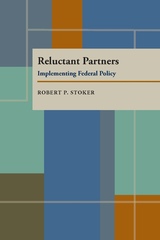
Constitutional principles at the core of the United States government divide authority between market and state and within the structure of the state itself. This diffusion of authority is valuable because it defends against the excesses of national government, causing federal policy initiatives to be more attuned to the concerns of local jurisdictions, and creating a context in which free enterprise may flourish.
However, this diffusion of authority weakens the control that federal officials enjoy over resources vital to the implementation of national policy. To implement their plans, federal policy formulators must often call upon autonomous participants such as state or local governments, advocacy groups, or commercial interests. When federal policy challenges the perspectives, interest, or priorities of these participants, they become reluctant partners. These implementation participants enjoy substantial autonomy, making their cooperation in pursuit of federal policy goals uncertain and difficult to achieve. How, then, can the federal government secure the cooperation it needs to implement policy when the act of implementation empowers potential adversaries?
Reluctant Partners explores these problems and proposes strategies to reduce the impediments to cooperation and promote policy coordination. Drawing upon theories of regime development and cooperation, Stoker suggests the “implementation regime framework” to analyze the difficulties of realizing cooperation in the implementation process. The framework is illustrated with numerous vignettes and two extensive case studies: the National School Lunch Program and federal nuclear waste disposal policy.

But there is a dark underside to the exercise of these skills. A growing number of babies live only to be tethered to life-support systems, unconscious or suffering incessant pain for years and sometimes for the duration of their lives. The ethical issues raised by these children are among the most difficult in our society. Should life be maintained no matter what its quality? Or is there a point at which treatment should be stopped on humane grounds? Who is to make decisions on continuing or ending therapy for damaged children? Is the law a suitable instrument for regulating medical decisions in intensive care nurseries? Should the growing cost of intensive care influence therapy decisions?
Special Care explores the moral and legal issues in neonatal intensive care. Fred M. Frohock spent four months in a special care nursery, observing the daily actions of doctors and nurses and interviewing staff and parents of patients. This engaging, human drama is told through the author's own journal entries interspersed with generous excerpts from taped interviews that display the practical reasoning of staff and parents as they address the moral problems raised by intensive care medicine. Several case studies of infants highlight the often contradictory directions in which medical staffs are pulled and the painful decisions that doctors and parents together are often called upon to make. The result is a book that reconstructs the ordinary life of a neonatal nursery and presents the moral views of those who are most intimately involved in therapy decisions.
This book is an urgently needed entry in the current discussions of treatment for badly damaged babies. Frohock argues that our tradition of rights language, which rests on the premise that we know what a human being is, is inappropriate when dealing with the paradoxes of decision making in neonatal nurseries. Calling for a new moral vocabulary better adapted to the world of medicine, he introduces the notion of harm in place of rights, a concept drawn from medicine's Hippocratic oath that pledges to "do no harm," as a way to begin framing questions and making decisions. Special Care will interest anyone who wants to understand medical decisions at the margins of human life.
READERS
Browse our collection.
PUBLISHERS
See BiblioVault's publisher services.
STUDENT SERVICES
Files for college accessibility offices.
UChicago Accessibility Resources
home | accessibility | search | about | contact us
BiblioVault ® 2001 - 2024
The University of Chicago Press









